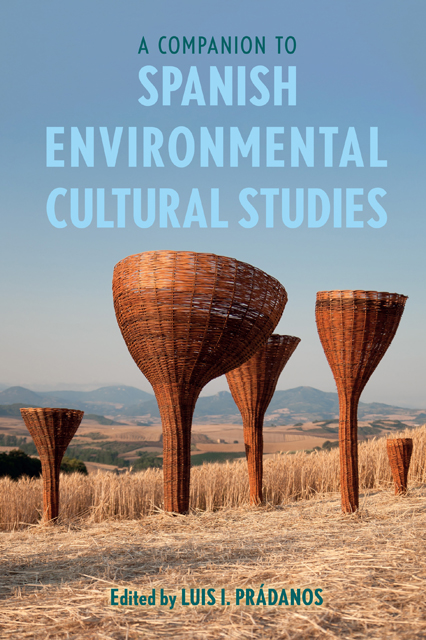Book contents
- Frontmatter
- Contents
- List of Illustrations
- List of Contributors
- Note on the Translations
- Acknowledgements
- Introduction: Spanish Environmental Cultural Studies
- Part I Environmental Cultural History and Political Ecology
- Part II Water and Power
- Part III Ecologies of Memory and Extractivism
- Part IV Animal Studies and Multispecies Ethnographies
- Part V Food Studies and Exploitative Ecologies
- Part VI Ecofeminism
- Part VII (Neo)Colonial and Racialized Ecologies
- Part VIII Tourism and the Environmental Imagination
- Part IX Eco-Mediation and Representation
- Part X Trash and Discard Studies
- Bibliography
- Index
10 - What’s in a Name? Animals and Humanities Biogeography
Published online by Cambridge University Press: 08 June 2023
- Frontmatter
- Contents
- List of Illustrations
- List of Contributors
- Note on the Translations
- Acknowledgements
- Introduction: Spanish Environmental Cultural Studies
- Part I Environmental Cultural History and Political Ecology
- Part II Water and Power
- Part III Ecologies of Memory and Extractivism
- Part IV Animal Studies and Multispecies Ethnographies
- Part V Food Studies and Exploitative Ecologies
- Part VI Ecofeminism
- Part VII (Neo)Colonial and Racialized Ecologies
- Part VIII Tourism and the Environmental Imagination
- Part IX Eco-Mediation and Representation
- Part X Trash and Discard Studies
- Bibliography
- Index
Summary
“The beginning of wisdom is to call things by their proper name.”
(Confucius)Like other domestic animals, the Spanish fighting bull (Bos taurus Ibericus) is not technically wild. He does not live hidden away deep in a forest. He is no lion that threatens to kill human livestock. The Spanish fighting bull, however, can be compared to wild animals that have survived in the Anthropocene. In the orchestrated raising of Bos taurus Ibericus, humans oversee breeding and provide pastures for the bull to grow and thrive. Although domestic, humans create a wild space designed for the wild-like animal before he meets his fate at the hands of the bullfighter.
Humanity today is essentially a hunter of the last wild mammals, and humans essentially do the same with the few “wild” mammals remaining on the earth as they do with the Spanish fighting bull. The “hidden” forest where the hunted wild mammal lives is not really hidden from the hunter. Humans, not the wild animal, decide the fateful day when he or she must appear as object in the eye of the hunter’s weapon.
In contrast to most of the planet’s wild mammals, the population of the Spanish fighting bull did not fall to near oblivion over the last five centuries. If wild animals are to survive, what can they learn from the bull in order to convince humans to do all they can humanly do to keep them alive? What lesson should humans take from the bull so as to continue sharing the planet with the surviving wild animals?
The Spanish fighting bull can teach a humanities biogeography lesson to scholars in the field of environmental cultural studies. As a field, environmental cultural studies needs no introduction. The essays in this collection show that scholars of culture increasingly see it as their task to contribute to the betterment of the earth’s environment. Cultural studies has become a companion to the sciences because the subject offers its own tools for approaching ecological studies of the planet. For instance, it often is better equipped than the sciences in the rhetorical tools to effectively communicate models of human practice for bettering or rebuilding the planet’s ecology.
Exemplary of animals in the Anthropocene, bulls employed a brilliant strategy of survival that more animals need: they lived and prospered within a human-controlled ecosystem.
- Type
- Chapter
- Information
- A Companion to Spanish Environmental Cultural Studies , pp. 119 - 124Publisher: Boydell & BrewerPrint publication year: 2023



